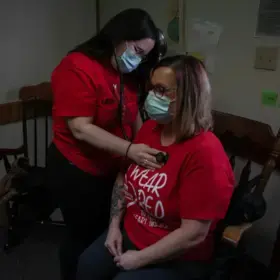By Elizabeth Reis, Ph.D.
It’s all the more commendable to celebrate Pride Month, affirm LGBTQI+ rights, and visibly advocate for those rights when the community is under siege. So far this year, for example, state legislators have introduced 586 bills that limit the rights of transgender individuals using various restrictions. In Florida, people can be thrown in jail for using the bathroom of their gender identity rather than their sex assigned at birth. Other anti-trans laws make it a crime (fraud) to amend one’s driver’s license so that it aligns with one’s identity. Many states have severely curtailed gender-affirming health care, not just for young people but for consenting adults as well.
In the Gender, Sex, and Bioethics class that I teach in Columbia's Master's in Bioethics program, we examine traditional sex and gender binaries, including how they have been prescribed and enforced throughout American medical history up to the present day. The class illuminates key bioethical questions, including tensions concerning individuals’ rights; the benefits and harms of the choices people face; and the broader social and cultural contexts in which people make decisions related to gender and sexuality.
In my view, supporters of these proposed laws want people to be “normal,” and by “normal,” they mean “not trans.” They want everyone to identify with the sex they were assigned at birth. This imperative leaves people born with intersex (the “I” in LGBTQI) traits in a particular bind. Sometimes, physicians aren’t sure what sex to assign a baby born with intersex characteristics, but adherence to the sex and gender binary is mandatory. Because of this, since the 1950s, doctors have surgically and hormonally altered children’s bodies so that they looked more typically male or female, even though most intersex conditions are just anatomical variations and don’t require medical intervention. For several decades now, intersex people who have endured such “treatment” have been trying to persuade physicians to forgo performing these so-called corrective procedures, which are irreversible. They advocate letting these children grow up with their genital, gonadal, or hormonal difference, allowing them to decide for themselves when they are old enough to participate in such weighty and permanent decisions about their bodies.
Anti-trans bills extend their reach into intersex medicine by creating exemptions regarding gender-affirming care; young trans people who seek such care are denied it, but the bills have typically gone out of their way to exempt intersex children from their prohibitions. A proposed South Dakota anti-trans law, for example, specified that it’s permissible for doctors to continue their medical interventions on intersex children, those with a “medically-verifiable genetic disorder of sex development.” (Note the bias of the terminology itself, with its designation of intersex as a disorder, a claim that has been vigorously contested.) The exemptions are made in an effort to create “normal” bodies with “normal” genitals and “normal” heterosexual desire, and ensuring heterosexual desire has long motivated intersex medical intervention.
Only fairly recently have we stopped considering same-sex desire a perversion. That historical shift alone is indeed worth celebrating. Though homosexuality is no longer labeled a psychological disorder, LGBTQI+ people still face homophobic comments or even violence when they walk with their partners in public; some are forced to endure psychological and religious “conversion therapy” to become straight and, again, “normal.” Those who are gender-nonconforming have to worry now about where they can go to the bathroom safely every time they leave their homes. So too do they have to navigate uncertain travel in our age of security that requires showing identification in which their name, photo, and gender might not match. Even routine doctors’ visits cannot guarantee LGBTQI+ people that they will get their health-care needs met with their dignity intact.
Medicine and politics have been shaped by social anxieties about marriage, heterosexuality, and same-sex desire throughout American history. Medical “fixes” and legislative bans are not something to be proud of. Let’s celebrate Pride by affirming the full spectrum of human diversity and creativity.
About the Author
Elizabeth Reis is a professor of Medical Ethics and Gender Studies at the Macaulay Honors College at the City University of New York and the author of Bodies in Doubt: An American History of Intersex. She teaches the Gender, Sex, and Bioethics course in the Columbia School of Professional Studies Bioethics program.
About the Program
Columbia University’s Master of Science in Bioethics grounds students in interdisciplinary approaches and models to address pressing bioethical challenges such as stem cell research and health-care reform. The program prepares students to act as responsible and responsive leaders in this new and ever-growing field. It also includes a concentration in global bioethics—the first of its kind in the U.S. Columbia's Bioethics program offers a range of degrees and courses.



